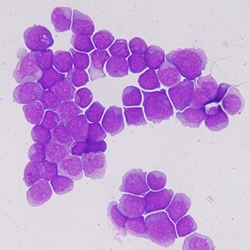3 April 2015. MD Anderson Cancer Center in Houston is granting Astellas Pharma Inc. in Tokyo an option to license MD Anderson’s discovery of a synthetic antibody showing promise as a treatment for acute myeloid leukemia. For the licensing option, MD Anderson could earn up to $26 million in fees and research funding.
Acute myeloid leukemia is a cancer of the blood and bone marrow that worsens quickly if left untreated. As the disease develops, bone marrow produces abnormal white blood stem cells called myeloblasts that do not mature into normal functioning white blood cells. The excessive growth of abnormal myeloblasts crowds out healthy white, red, and platelet blood cells, and can spread to other parts of the body.
While people with acute myeloid leukemia often face limited survival prospects, the disease is susceptible to immunotherapy. MD Anderson researchers in the lab of cell biologist Jeffrey Molldrem discovered an antigen that can trigger an immune response to address the disease, and developed a synthetic humanized antibody triggering that antigen. The antibody, code-named h8F4, is designed not only to target the antigen, but also stimulate receptors on T-cells, immune system cells that boost the antibody’s potency.
Molldrem and colleagues tested h8F4 on cell lines in lab cultures and found the antibody binds to the targeted antigen and engages with T cells. Tests with lab mice show the antibody eliminated acute myeloid leukemia grafted on the animals. MD Anderson plans early-stage human clinical trials testing safety and efficacy of h8F4, which will be led by Molldrem and Carlo Toniatti, research director of MD Anderson’s Institute for Applied Cancer Science.
The researchers believe h8F4 technology can offer a safer, as well as more effective therapy for acute myeloid leukemia. “Current treatments for aggressive leukemias are often toxic,” says Molldrem in an MD Anderson statement. “We desired to develop a safer, yet more potent, therapy for these aggressive cancer types that currently have poor survival outcomes.”
In the deal with Astellas, MD Anderson is granting the company an option to negotiate an exclusive, worldwide license for h8F4, following the early-stage clinical trials. For that option, Astellas is paying MD Anderson up to $26 million, which is also expected to cover further research expenses.
Read more:
- Novartis, Aduro Biotech Partner on Cancer Immunotherapy
- FDA Approves Antibody for Childhood Nerve Cell Cancer
- Lung Cancer Antibody Given FDA Breakthrough Tag
- Zymeworks, Celgene to Develop Double-Binding Antibodies
- Amgen, Kite Pharma Partner on Personal Cancer Immunotherapy
* * *


 RSS - Posts
RSS - Posts
You must be logged in to post a comment.